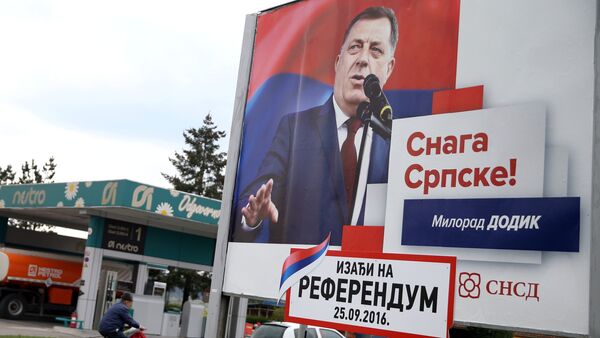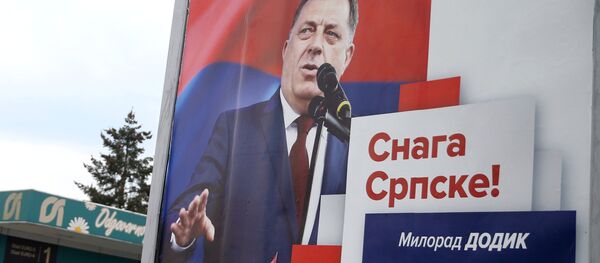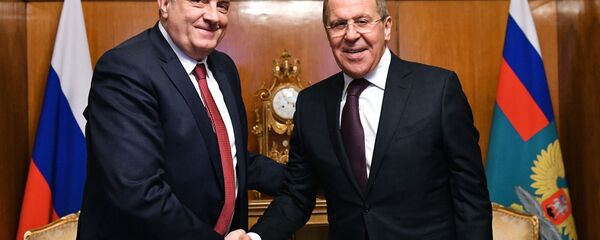Sputnik: I would like to first ask, of course, whether there is any news on the formation of a government in Bosnia and Herzegovina (elections in the country were held on 7 October 2018, but a cabinet has not yet been formed — Sputnik).
Milorad Dodik: This is Bosnia and Herzegovina, a country where it is very difficult to achieve a functioning state due to the impossibility of reaching basic agreements because of the very concept of its structure… So we are constantly in state of anticipation of something. At the moment it's about different political ambitions and Bosniaks, who want to play a dominant role in all processes, regardless of constitutional order and electoral legislation.
But this time it will not work. Republika Srpska (RS) knows its status and rights within Bosnia. We do not expect any favours from Bosniaks, we expect to only get what belongs to us, the Serbs, according to law. And according Bosnia's Constitution the RS elects one third of all ministers in the government. That is, three out of nine. So no one should make any concessions to us. This is our right guaranteed by the Constitution.
Sputnik: Is the reason for the disagreement, why the government cannot be formed, the Membership Action Plan (MAP)?
Milorad Dodik: Yes, this is a plan for joining NATO. They tell us that this is not about NATO membership. But it actually says that this is a membership plan. So what can it be about? RS has clearly expressed its military neutrality, and we will not bargain on this matter. Bosniaks insist on their own, as if the question of elections or the formation of the cabinet is something that is determined by the decision on NATO. We cooperate with NATO in the framework of the Partnership for Peace. We have an Individual Partnership Action Plan (IPAP) within which there are various cooperation mechanisms. At the moment RS is completely unprepared to raise the question of further institutional or contractual cooperation with NATO, taking into account Republika Srpska's adherence to military neutrality.
Sputnik: You recently said that a British centre had been formed in Sarajevo to counter "malignant Russian influence". You also drew attention to London's activities in Bosnia and Herzegovina earlier, before the elections, and spoke of the 40 representatives of the UK's special services who arrived in the country with the same goal.
Milorad Dodik: Their task was to help their candidates in the elections, and it was not me. However, I was still elected. So they are not all-powerful. We pay too much attention to them. But if we already know that they are here then we need to resist them. We were tracking these people at the time.
Sputnik: How did you do it?
This time they've set up an intelligence centre in Sarajevo that is run by a Bosniak. They are allegedly trying to identify the promoters of Russian influence, to show that everything is organised and that someone there gets some tasks every day, which, of course, isn't true. They have a problem with one well-known fact, namely, that these people have historically had fraternal feelings towards the Russian people. I can tell you with confidence that there is no malignant Russian influence here.
The British are the ones that have a malign influence. It's malignant because they want to fight "Russian influence" with intimidation, deception, and fraud. But they have one problem, because here everyone feels respect for Russia and what it does. I've met with Putin more than ten times, never once did he say that we need to do something, but I've always asked him what he could do to help us and asked to help maintain peace. If this is malignant influence, then I am the first one on the list of Russian agents.
READ MORE: Milorad Dodik Vows to Push BiH Recognition of Crimea as Part of Russia
Sputnik: Kosovar Albanians are doing something similar to what Britain was trying to do at the UN with the Srebrenica Declaration, according to which Serbs were found guilty of genocide. Now Albanians are trying to push through a resolution on Kosovo and Metohija in the US Congress…
Milorad Dodik: I believe in Trump's policy, I think he understands the situation here, despite the fact that in the three years of his presidency he couldn't beat the so-called "deep state". But his statements during the election campaign and the beginning of his presidency show that he's in favour of a policy aimed at strengthening America, which implies non-interference in the internal affairs of other states. The previous US administration not only intervened, it controlled the macroprocesses in Bosnia. It is known that it supported the Albanian policy in the Balkans and that this old political line of the US presented Kosovo as a precedent, and recommended that Republika Srpska keep quiet while it was in absolutely the same circumstances. There are many countries that refuse to recognise Kosovo — but it was easier for them to recognise Kosovo at the time than to have problems with America.
This story with Albanians and Americans is a repetition of the past. If Americans could've passed something through about Kosovo at the UN they would have done it. However, they did not succeed, which says a lot about their political power.



